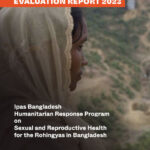
This evaluation report details the 2022 performance evaluation of the “Humanitarian Response Program” implemented in the Rohingya refugee camps in Cox’s Bazar, Bangladesh by Ipas. The evaluation assessed facility readiness and capacity of the service providers to provide comprehensive menstrual regulation (MR), post abortion care (PAC), contraceptive services and trauma/survival centered care. This evaluation also documents relevant challenges and barriers faced during program implementation and provides recommendations for the program’s sustainability and future
scale-up.
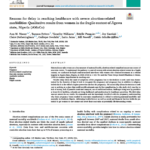
This article describes the pathways to care for women with severe abortion-related near miss events in a fragile context.
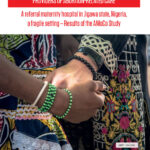
This evidence brief from the AMoCo study presents selected results of a knowledge, attitudes, practices, and behaviors (KAPB) survey given to health professionals in Jahun, Nigeria providing abortion-related care.
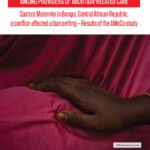
This evidence brief from the AMoCo study presents selected results of a knowledge, attitudes, practices, and behaviors (KAPB) survey given to health professionals providing abortion-related care. Providers are critical to providing timely and high-quality comprehensive abortion care (CAC) that can decrease abortion-related complications. This survey aims not only to assess the KAPB of CAC providers in hospital settings but to identify provider-related barriers to adequate CAC and points for improvement in the provision and accessibility of CAC services.
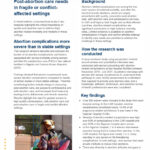
This research snapshot summarizes methods, key findings, and implications of the Abortion-related Morbidity and Mortality in Conflict-affected and Fragile Settings study conducted in Jahun, Nigeria and Bangui, Central African Republic.
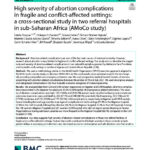
This study describes the magnitude and severity of abortion-related complications in two referral hospitals located in two different types of fragile and conflict-affected settings and supported by Médecins Sans Frontières.
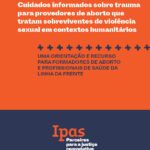
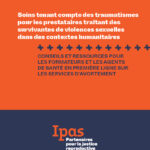
Conseils et ressources pour les formateurs et les agents de santé en première ligne sur les services d’avortement
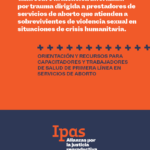
Orientación y recursos para capacitadores y trabajadores de salud de primera línea en servicios de aborto.
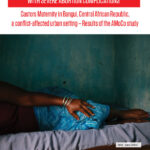
This evidence brief summarizes key findings from the qualitative component of the AMoCo study, which aims to describe the access to care and treatment of women and girls hospitalized in Castors Maternity Hospital in Bangui for potentially life-threatening and near-miss abortion complications such as severe haemorrhage, severe sepsis, and uterine and intra-abdominal perforation.
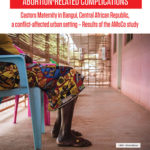
This eight-page brief outlines selected findings from a research project on the burden of abortion-related complications and their contributing factors in the Maternity of Castors in Bangui, Central African Republic. The study found a greater severity of abortion-related complications in this facility compared to African hospitals in stable settings and reinforces the need to recognize abortion as a serious health issue among fragile or crisis-affected populations.
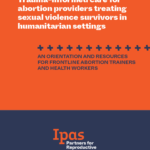
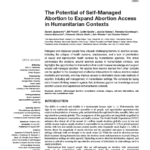
Refugees and displaced people face uniquely challenging barriers to abortion access, including the collapse of health systems, statelessness, and a lack of prioritization of sexual and reproductive health services by humanitarian agencies. In this commentary published in Frontiers in Global Women’s Health, the authors summarize the evidence around abortion access in humanitarian contexts, and highlight the opportunities for interventions that could increase knowledge and support around self-managed abortion.

This evaluation report details the 2022 performance evaluation of the “Humanitarian Response Program” implemented in the Rohingya refugee camps in Cox’s Bazar, Bangladesh by Ipas. The evaluation assessed facility readiness and capacity of the service providers to provide comprehensive menstrual regulation (MR), post abortion care (PAC), contraceptive services and trauma/survival centered care. This evaluation also documents relevant challenges and barriers faced during program implementation and provides recommendations for the program’s sustainability and future
scale-up.
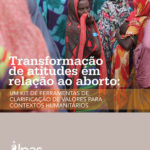
O aborto por profissionais treinados é um procedimento seguro e comum, legal sob pelo menos uma condição em quase todos os países do mundo. No entanto, mulheres e meninas que vivem em ambientes humanitários muitas vezes não podem obter este serviço essencial de saúde reprodutiva – mesmo quando está disponível para outras mulheres em um país que acolhe refugiados.
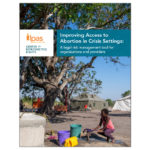
This tool is designed to help program planners and organizations understand abortion law and manage legal risk when providing or supporting access to abortion for people who are displaced by crisis. It provides general guidance and can be used online or in-person and with program teams, field teams, program managers and other decision-makers. It can also be incorporated in risk- and security-assessment processes.
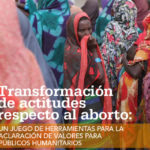
Cuando es efectuado por prestadores de servicios capacitados, el aborto es un procedimiento seguro y común, legal bajo por lo menos una causal en casi todos los países del mundo. Sin embargo, las mujeres y niñas que viven en entornos humanitarios a menudo no pueden obtener este servicio esencial de salud reproductiva, aun cuando está a la disposición de otras mujeres en un país que alberga a refugiados.
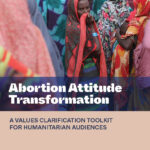
Abortion by trained providers is a safe and common procedure, legal under at least one condition in nearly every country in the world. Yet women and girls living in humanitarian settings often cannot get this essential reproductive health service—even when it’s available to other women in a country hosting refugees.
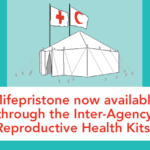
This card for humanitarian professionals provides instructions for obtaining Inter-Agency RH Kits, information on why mifepristone is now available in the kits, and a summary of WHO dosing regiments for abortion with mifepristone and misoprostol.
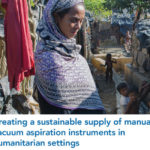
This card for humanitarian professionals provides an overview of manual vacuum aspiration (MVA) for safe abortion with a focus on humanitarian settings—plus instructions for how to obtain MVA equipment through Inter-Agency RH Kits and from DKT WomanCare.
- 1
- 2

